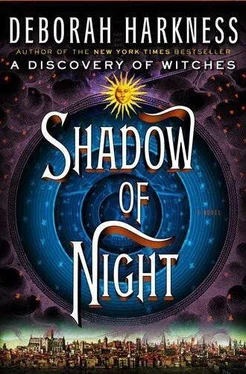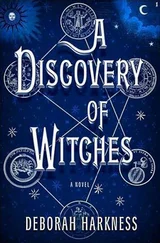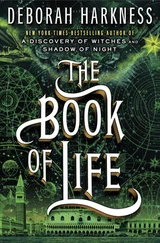Shakespeare wondered idly about the fate of Marlowe and his friends, all of them as insubstantial as shadows now. Henry Percy was enjoying a rare period of royal benevolence and was forever at court. Raleigh had married in secret and fallen from the queen’s favor. He was now rusticated to Dorset, where the queen hoped he would be forgotten. Harriot was in seclusion somewhere, no doubt bent over a mathematical puzzle or staring at the heavens like a moonstruck Robin Goodfellow. Rumor had it that Chapman was on some mission for Cecil in the Low Countries and penning long poems about witches. And Marlowe was recently murdered in Deptford, though there was talk that it had been an assassination. Perhaps that strange Welshman would know more about it, for he’d been at the tavern with Marlowe. Roydon—who was the only truly powerful man Shakespeare had ever met—and his mysterious wife had both utterly vanished in the summer of 1591 and had not been seen since.
The only one of Marlowe’s circle that Shakespeare still heard from regularly was the big Scot named Gallowglass, who was more princely than a servant ought to be and told such wonderful tales of fairies and sprites. It was thanks to Gallowglass’s steady employment that Shakespeare had a roof over his head. Gallowglass always seemed to have a job that required Shakespeare’s talents as a forger. He paid well, too—especially when he wanted Shakespeare to imitate Roydon’s hand in the margins of some book or pen a letter with his signature.
What a crew , Shakespeare thought. Traitors, atheists, and criminals, the lot of them . His pen hesitated over the page. After writing another word, this one decisively thick and black, Shakespeare sat back and studied his new verses.
Black is the badge of hell,
The hue of dungeons
and the school of night.
It was no longer recognizable as Marlowe’s work. Through the alchemy of his talent, Shakespeare had transformed a dead man’s ideas into something suitable for ordinary Londoners rather than dangerous men like Roydon. And it had taken him only a few moments.
Shakespeare felt not a single pang of regret as he altered the past, thereby changing the future. Marlowe’s turn on the world’s stage had ended, but Shakespeare’s was just beginning. Memories were short and history unkind. It was the way of the world.
Pleased, Shakespeare put the bit of paper into a stack of similar scraps weighted down with a dog’s skull on the corner of his desk. He’d find a use for the snippet of verse one day. Then he had second thoughts.
Perhaps he’d been too hasty to dismiss “true love lost .” There was potential there—unrealized, waiting for someone to unlock it. Shakespeare reached for a scrap he’d cut off a partially filled sheet of paper in a halfhearted attempt at economy after Annie had shown him the last butcher’s bill.
“Love’s Labour’s Lost ,” he wrote in large letters.
Yes, Shakespeare mused, he’d definitely use that one day.
Libri Personæ : The People of the Book
Those noted thus * acknowledged by historians .
Part I: Woodstock: The Old Lodge
Diana Bishop, a witch
Matthew de Clermont, known as *Roydon, a vampire
* Christopher Marlowe, a daemon and maker of plays
Françoise and, Pierre, both vampires and servants
* George Chapman, a writer of some reputation and little patronage
* Thomas Harriot, a daemon and astronomer
* Henry Percy, the Earl of Northumberland
* Sir Walter Raleigh, an adventurer
Joseph Bidwell, senior and junior, shoemakers
Master Somers, a glover
Widow Beaton, a cunning woman
Mister Danforth, a clergyman
Master Iffley, another glover
Gallowglass, a vampire and soldier of fortune
* Davy Gams, known as Hancock, a vampire, his Welsh companion
Part II: Sept-Tours and the Village of Saint-Lucien
* Cardinal Joyeuse, a visitor to Mont-St-Michel
Alain, a vampire and servant to the sieur de Clermont Philippe de Clermont, a vampire and lord of Sept-Tours Chef, a cook
Catrine, Jehanne, Thomas, and Etienne, servants Marie, who makes gowns
André Champier, a wizard of Lyon
Part III: London: The Blackfriars
* Robert Hawley, a shoemaker
* Margaret Hawley, his wife
* Mary Sidney, the Countess of Pembroke Joan, her maid
* Nicholas Hilliard, a limner
Master Prior, a maker of pies
* Richard Field, a printer
* Jacqueline Vautrollier Field, his wife
* John Chandler, an apothecary near the Barbican Cross
Amen Corner and Leonard Shoreditch, vampires
Father Hubbard, the vampire king of London
Annie Undercroft, a young witch with some skill and little power
* Susanna Norman, a midwife and witch
* John and Jeffrey Norman, her sons
Goody Alsop, a windwitch of St. James Garlickhythe
Catherine Streeter, a firewitch
Elizabeth Jackson, a waterwitch
Marjorie Cooper, an earthwitch
Jack Blackfriars, a nimble orphan
* Doctor John Dee, a learned man with a library
* Jane Dee, his disgruntled wife
* William Cecil, Lord Burghley, the Lord High Treasurer of England
* Robert Devereux, the Earl of Essex
* Elizabeth I, Queen of England
* Elizabeth (Bess) Throckmorton, maid of honor to the queen
Part IV: The Empire: Prague
Karolína andTereza, vampires and servants
* Tadeáš Hájek, physician to His Majesty
* Ottavio Strada, Imperial librarian and historian
* Rudolf II, Holy Roman Emperor and King of Bohemia
Frau Huber, an Austrian, and Signorina Rossi, an Italian, women of Malá Strana
* Joris Hoefnagel, the artist
* Erasmus Habermel, maker of mathematical instruments
* Signor Miseroni, who carves in precious stones
* Signor Passetti, his majesty’s dancing master
* Joanna Kelley, a woman far from home
* Edward Kelley, a daemon and alchemist
* Rabbi Judah Loew, a wise man
Abraham ben Elijah of Chelm, a wizard with a problem
* David Gans, an astronomer
Herr Fuchs, a vampire
* Melchior Maisel, a prosperous merchant of the Jewish Town
Lobero, a Hungarian dog sometimes mistaken for a mop, probably just a Komondor
* Johannes Pistorius, a wizard and theologian
Part V: London: The Blackfriars
* Vilem Slavata, a very young ambassador
Louisa de Clermont, a vampire and sister to Matthew de Clermont
* Master Sleford, who watches over the poor souls of Bedlam
Stephen Proctor, a wizard
Rebecca White, a witch
Bridget White, her daughter
Part VI: New World, Old Worlde
Sarah Bishop, a witch and aunt to Diana Bishop
Ysabeau de Clermont, a vampire and mother to Matthew de Clermont Sophie Norman, a daemon
Margaret Wilson, her daughter, a witch
Other Characters in Other Times
Rima Jaén, a librarian of Seville
Emily Mather, a witch and partner to Sarah Bishop
Marthe, housekeeper to Ysabeau de Clermont
Phoebe Taylor, very proper, who knows something about art
Marcus Whitmore, Matthew de Clermont’s son, a vampire
Verin de Clermont, a vampire
Ernst, her husband
Peter Knox, a witch and member of the Congregation Pavel Skovajsa, who works in a library
* Gerbert of Aurillac in the Cantal, a vampire and ally of Peter Knox
* William Shakespeare, a scrivener and forger who also makes plays
So many people helped bring this book into the world.
First, thanks to my always gentle, always candid first readers: Cara, Fran, Jill, Karen, Lisa, and Olive. And a special thanks to Margie for claiming she was bored just as I was struggling with the last edit and offering to read the manuscript with her discerning writer’s eye.
Читать дальше












